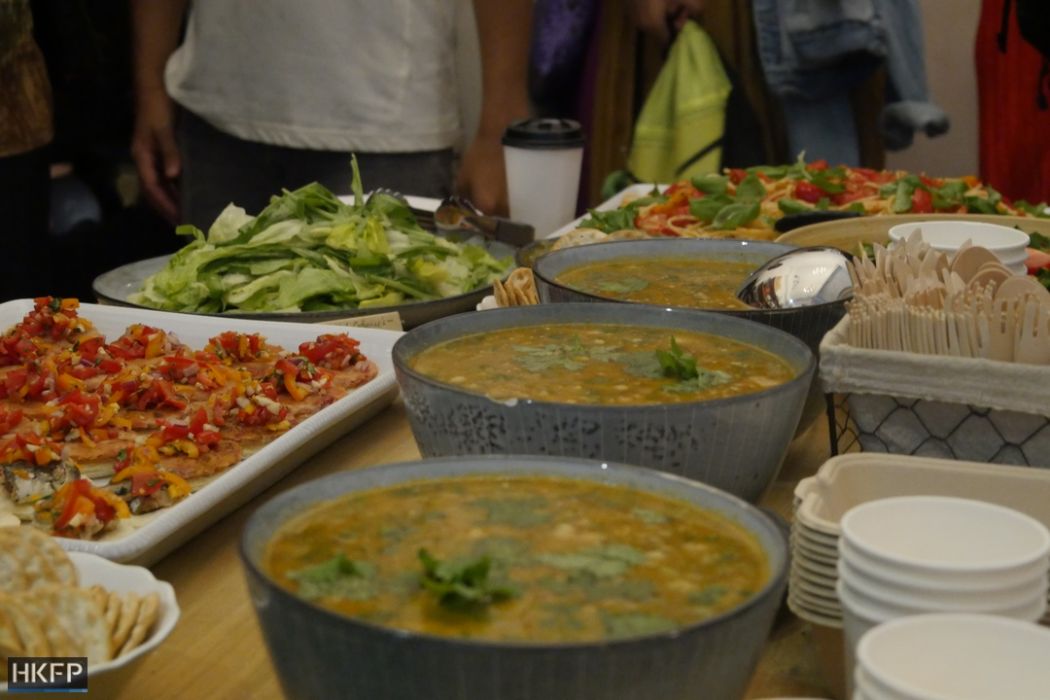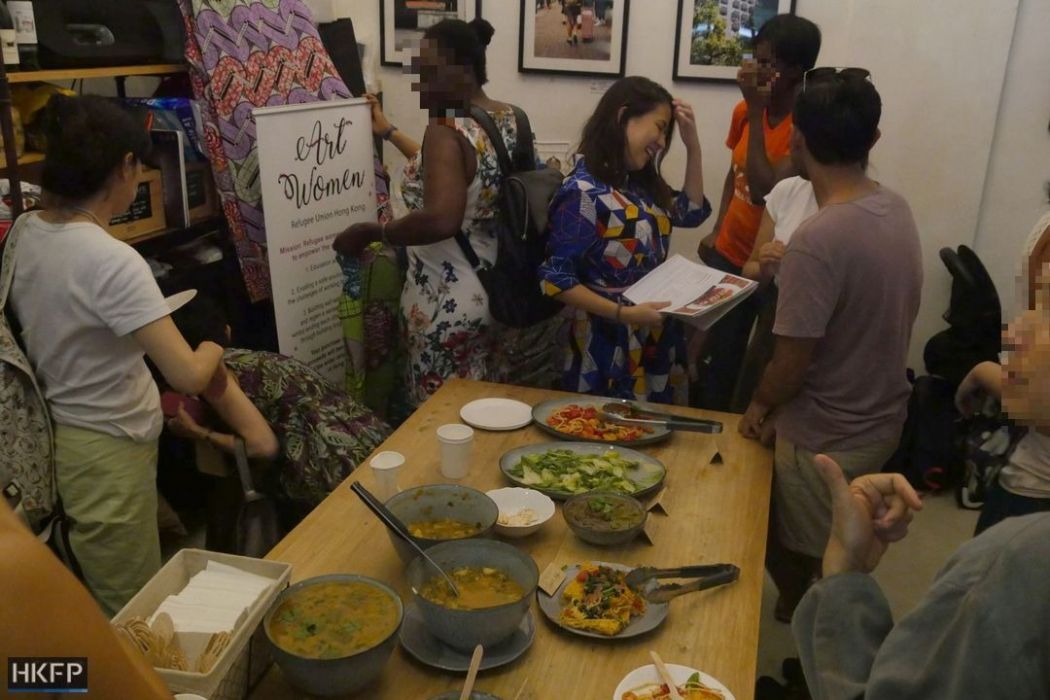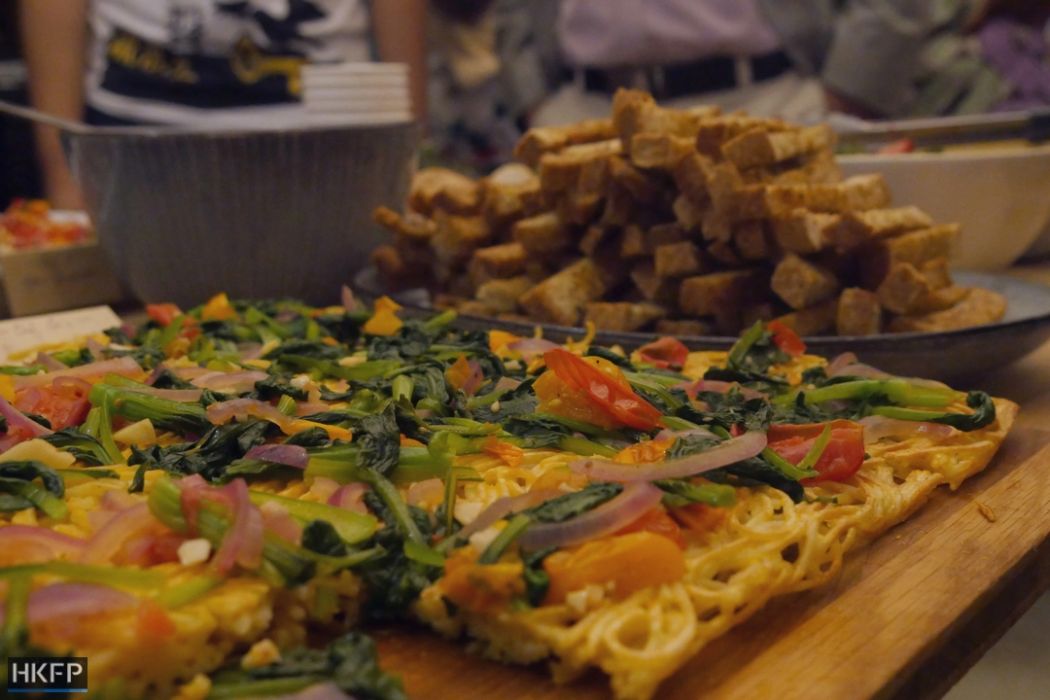Refugee groups showcased their home cuisines in Wan Chai on Saturday to mark last week’s World Refugee Day, featuring Sri Lankan, Egyptian, African and Togolese food.
The event was organised by NGOs Table of Two Cities and BiteUnite, in collaboration with multiple grassroots initiatives including Taste of Hope Hong Kong and Art Women.
Organisers said that the event aimed to create awareness of the cultural diversity of Hong Kong’s community and empower refugee groups through food. Around 30 refugees attended alongside 40 to 50 guests. Cooking demonstrations were also led by refugees.

Tegan Smyth, founder of Table of Two Cities, told HKFP: “Food is a natural equaliser. No matter we’re rich, poor, we have great social mobility or a lack of social mobility, we all have basic needs and they’re linked to food.”
A history of migration
Hong Kong has a long history of migration, as mainland Chinese fled to the city during the Chinese civil war between 1946 and 1950. Now it is a popular destination for economic migrants, who arrive in the financial hub in search of work opportunities, with foreign nationals comprising approximately 8.6 per cent of the population in 2016.
Refugees, however, make up just 0.2 per cent of Hong Kong’s population, according to NGO Justice Centre. From 2014 to 2017, 52 or 0.7 per cent of asylum seeker claims were accepted on the grounds of “non-refoulement” or torture. Unlike China, Hong Kong is not partied to the 1951 UN Refugee Convention.
Smyth told HKFP: “Hong Kong has not really had a proper dialogue about what exactly it means to be a refugee or an asylum seeker, or even had the introspection to think about the recent past when many people from China came to Hong Kong seeking asylum. [Today] there’s certain hostility.”
In 2006, pro-Beijing lawmaker Ann Chiang Lai-wan and Yau Tsim Mong District Council Chairperson Chris Ip launched a campaign to tackle the alleged issue of “fake refugees.” And in December 2017, Hong Kong deported 68 Vietnamese citizens after introducing a new screening method for refugee claimants.

‘For me, it’s my life’
John “Outsider,” his pen name, is an Iranian exile living in Hong Kong. “I was running from death,” he told HKFP.
After five and a half years, the immigration department rejected his refugee claim. “For them, it’s just a case. For me, it’s my life. But there is no way that I can complain about the quality of their work,” he told HKFP.
Asylum seekers are not allowed to work under current law; the Hong Kong government provides them instead with a less than HK$3,000 monthly allowance to cover rent, food and other living expenses. But Hong Kong remains one of the most expensive cities to live in – coming in fourth in a 2017 Economist Intelligence Unit study.
“Probably if you go around here and buy a drink, it’s going to cost you 80 dollars. That’s the food for two days of an asylum seeker,” John told HKFP.
“[Refugees] came here to start a new life because they didn’t have any back in their home country, for many reasons… If you can’t handle the procedure fast, give me some rights. Let me study, let me work, let me grow, not isolated in this place for such a long time.”
John has since published three novels about migration and social mobility.

Stress in the community
Smyth told HKFP: “The biggest challenge is the no work policy. I think that refugees who come here, or asylum seekers, they’re unable to work and they have kids here – their kids are stateless. That’s really the cause of a lot of stress in the community.”

Lucca Ricci, an Italian national attending the event, told HKFP: “In Italy, we are facing the same issue… more and more people are trying to escape their country and the first port is Italy. There’s still some uneasiness in local communities.”
“Through food culture, it brings people from different countries together, people who are refugees or seeking political asylum, to help them integrate into a new community.”
